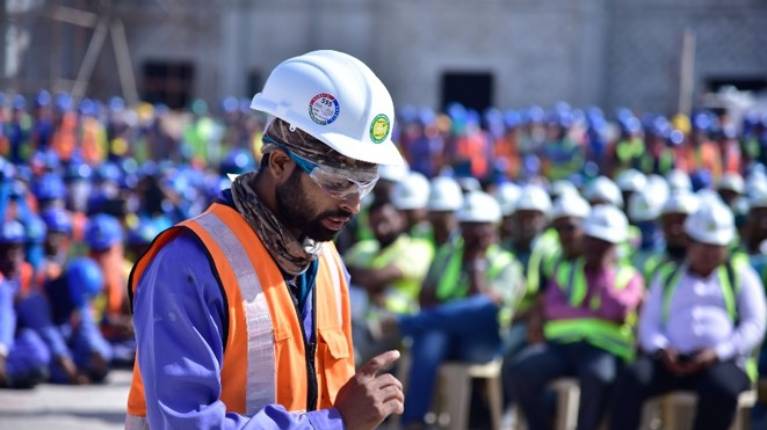Since winning the bid to host the 2022 World Cup more than a decade ago, Qatar has faced international scrutiny for rights violations.
The UN’s labour rights body praised Qatar’s Ministry of Labour (MOL) for publicly disclosing figures related to workers’ rights violations on Tuesday.
“The MOL’s enforcement efforts and the transparency shown in sharing these figures with the media should be commended. There’ll always be violations – and publicising this data sends a signal to employers that the labour inspectorate is taking action,” tweeted the International Labour Organization (ILO).
The tweet was in response to an article by The Independent, which revealed 276 violations of Qatar’s summer working hours law, which prevents workers from working outside between 10 am and 3:30 pm from 1 June until 15 September.
The law was initially introduced in 2007, just three years before Qatar won the bid to host the FIFA World Cup 2022. Before being amended last year, the law stipulated that outdoor working hours were from 11:30 am to 3 pm, between 15 June and 31 August.
MOL figures cited by the British media outlet pertained to violations recorded since 20 July when the law came into force. Notably, most violations were recorded in the construction sector.
“For years, the international community has been calling on Qatar to enforce the law and be more transparent on sharing data. Now we are seeing progress in these areas and it’s important to recognise this. More figures on labour complaints and inspection efforts are available,” added the ILO.
Meanwhile, a Qatari official told the media outlet that the numbers reported this year reflect “the relentless pressure being applied by the government on the business community.”
“There has been greater compliance among companies as enforcement measures continue to take hold and awareness of the new laws increases,” said the official.
However, the numbers still raise concerns among rights groups globally given that violations have continue to occur across various companies in Doha despite the laws.
“What does it say about Qatar law enforcement? It says employers are not worried about breaking the law and doing that so close to the World Cup should make people wonder how much other laws are being adhered to,” Nick McGeehan, a director of FairSquare Projects, a human rights and advocacy group, told The Independent.
Labour reform
The Gulf state has been working closely with the ILO, which opened its first office in Qatar in 2018, as well as other international bodies, to improve the local work environments.
Since winning the bid to host the 2022 World Cup more than a decade ago, Qatar has faced international scrutiny mainly by western countries over conditions for migrant workers as well as a lack of adequate laws to protect them in the Gulf state.
Doha has responded by introducing historic reform to tackle the issues, though implementation appears to be a concern.
This includes the dismantling of the controversial Kafala system and the introduction of the region’s first minimum wage law.
The Kafala system had stopped workers from freely changing jobs. However, some employers have continued to fail to abide by the law, posing challenges for employees navigating the process.
According to a recent ILO report, some workers also face retaliation from their employers when changing their jobs.
In 2021, the region’s first non-discriminatory minimum-wage law came into force, which established a monthly minimum wage of QAR 1,000. The law also includes the basic living allowances for select workers.
Employers who fail to comply with the law will face a one-year jail sentence and a QAR 10,000 fine.
In November last year, the local health ministry (MOPH) and the ILO signed a memorandum of understanding (MoU) to cooperate in data collection to better address work-related injuries and deaths.
The agreement came as a swift response to an Amnesty report titled “Reality Check” as well as a recent ILO report, both of which revealed gaps in data collection regarding expatriate workers’ injuries and deaths.
Despite the introduction of laws aimed at protecting workers, Qatari authorities say progress has been largely dismissed and ignored by critics.
In May, Qatar’s Amir Sheikh Tamim bin Hamad Al Thani said most of the criticism has come mainly due to the west’s struggle to accept the idea of an Arab state hosting such an event.
“For decades now, the Middle East has suffered from discrimination. And I have found that such discrimination is largely based on people not knowing us, and in some cases, refusing to get to know us,” the amir told the World Economic Forum (WEF) in Davos.







